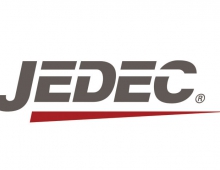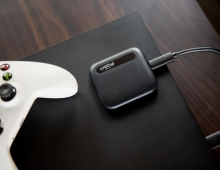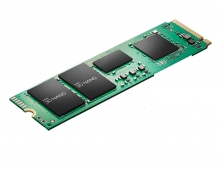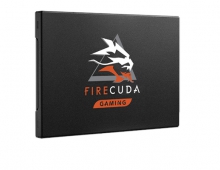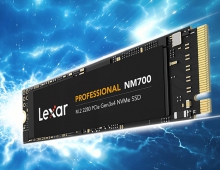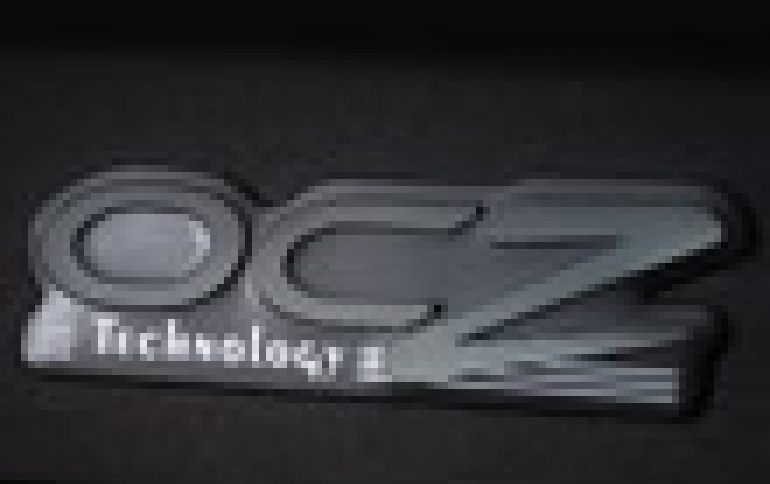
New OCZ Z-Drive 6000 Enterprise PCIe SSD Series Come With NVMe Support
OCZ today officially announced the Z-Drive 6000 series, the company's first NVMe compliant SSD designed for the enterpise. The new SSD series had briefly appeared at CES last January. It supports NVMe, a new a software/driver stack that replaces the AHCI. NVMe offers increased scalability (up to 64,000 outstanding commands versus 32 in AHCI) and a streamlined software stack that reduces latency and CPU overhead.
 The Z-Drive 6000 series supports the Windows 8.1 and Server 2012 R2, Linux, UNIX, Solaris, and VMware NVMe drivers. OCZ is also offering customized NVMe drivers for Windows, Linux, and VMware for drive management reasons.The Z-Drive 6000 series includes the 6000 and 6300 models. The 6300 uses more durable eMLC NAND, which boosts the endurance to three drive writes per day. The
6000 uses normal MLC, meaning its endurance is also limited to one drive write per day. As such, the 6000 is aimed more towards read-intensive applications, whereas the 6300 is suitable for mixed workloads.
The Z-Drive 6000 series supports the Windows 8.1 and Server 2012 R2, Linux, UNIX, Solaris, and VMware NVMe drivers. OCZ is also offering customized NVMe drivers for Windows, Linux, and VMware for drive management reasons.The Z-Drive 6000 series includes the 6000 and 6300 models. The 6300 uses more durable eMLC NAND, which boosts the endurance to three drive writes per day. The
6000 uses normal MLC, meaning its endurance is also limited to one drive write per day. As such, the 6000 is aimed more towards read-intensive applications, whereas the 6300 is suitable for mixed workloads.
The Z-Drive 6000 series will be available in capacities of 800GB, 1.6TB and 3.2TB. A 6.4TB Z-Drive 6300 is also in the works, set for release sometime in Q4'15.
The Z-Drive 6000 series employs PMC-Sierra's "Princeton" controller, which supports 16 NAND channels and a PCIe 3.0 x8 interface. OCZ has chosen to offer a dual-port -- two independent 3.0 x4 connections to the host. The dual port capabilities enable two host systems to concurrently access the same device or allows for redundancy inside the host. In the event of a system failure, if one of the data paths becomes compromised, the available data path continues operation as if no failure had occurred through the second port without loss in Quality of Service (QoS).
Other features include AES-256 encryption, full power loss protection and end-to-end data protection. The Z-Drive 6000 series also features user-configurable power modes (15W, 20W and 25W), which can be used to limit the power consumption in more temperature critical environments.
According to OCZ, the new SSDs are optimized for read performance and support up to 700K random read IOPS and write up to 160K IOPs. They also deliver consistent low-latency I/O responses of only 25 microseconds for a 4KB write and 80 microseconds for a 4KB read.
Performance figures given by OCZ for the Z-Drive 6000 SFF Series include sequential read performance up to 2,900 MB/s; sequential write performance up to 1,900 MB/s, random read performance up to 700K IOPS and random write performance up to 160K IOPS. Latencies are 25µs (write) and 80µs (read).
For the Z-Drive 6300, performance includes sequential read performance up to 2,900 MB/s, sequential write performance up to 1,400 MB/s, random read performance up to 700K IOPS and random write performance up to 120K IOPS. Includes lowest latencies of 30µs (write) and 80µs (read).
OCZ will also offer the 6300 AIC Series for mixed workload applications, which supports Half-Height/Half-Length (HHHL) add-in card form factors and usable capacities of 800GB, 1.6TB, 3.2TB and 6.4TB. Availability is expected in the second half of 2015.
The company is currently sampling the Z-Drive 6000 series to customers and partners.
| Specifications |
||
6000 |
6300 |
|
| Capacities | 800GB; 1,6TB, 3,2TB |
|
| Form Factors 2.5" 15mm (SFF-8639) |
2.5" 15mm & HHHL AIC |
|
| Interface | PCIe 3.0 x4 (NVMe 1.1b) |
|
| Controller | PMC-Sierra "Princeton" |
|
| NAND Toshiba A19nm 128Gbit MLC |
Toshiba A19nm 128Gbit eMLC |
|
| Endurance 1 DWPD |
3 DWPD |
|
| Encryption | AES-256 |
|
| Power Loss Protection Yes |
Yes |
|
| Warranty | Five Years |
|
| Price $1.70/GB |
$2.00/GB |
|
Performance Specifications |
||||||
| Model | 6000 |
6300 |
||||
| Capacity | 800GB |
1,600GB |
3,200GB |
800GB |
1,600GB |
3,200GB |
| Raw NAND Capacity | 1,024GiB |
2,048GiB |
4,096GiB |
1,024GiB |
2,048GiB |
4,096GiB |
| 128KB Sequential Read | 2.2GB/s |
2.9GB/s |
2.9GB/s |
2.2GB/s |
2.9GB/s |
2.9GB/s |
| 128KB Sequential Write | 1.3GB/s |
1.9GB/s |
1.9GB/s |
1.0GB/s |
1.4GB/s |
1.4GB/s |
| 4KB Random Read | 600K IOPS |
700K IOPS |
700K IOPS |
600K IOPS |
700K IOPS |
700K IOPS |
| 4KB Random Write | 115K IOPS |
160K IOPS |
160K IOPS |
75K IOPS |
120K IOPS |
120K IOPS |
| Mixed 4KB 30R / 70W | 290K IOPS |
330K IOPS |
330K IOPS |
230K IOPS |
280K IOPS |
280K IOPS |
| Idle Power Consumption | 9W |
9W |
9W |
9W |
9W |
9W |
| Active Power Consumption | 25W |
25W |
25W |
25W |
25W |
25W |

